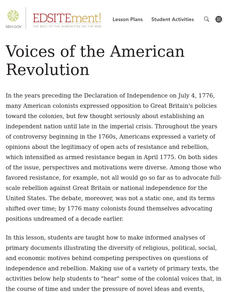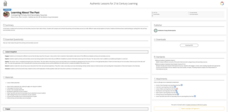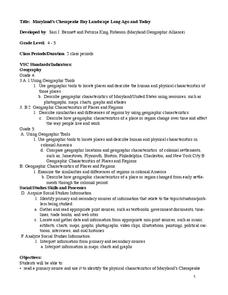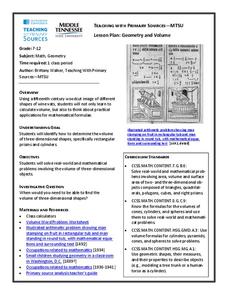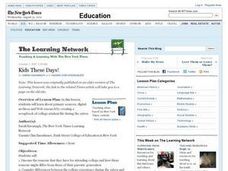Curated OER
Introduction of Primary Sources: Introduction to TDC site (Lesson 3)
First graders are introduced to using a database as a primary source. Using the internet, they choose a site of artifacts and practice navigating through the site. They identify an artifact and draw them on a large piece of white...
Curated OER
Voices of the American Revolution - Primary Documents
Students use primary documents to examine the attitudes and positions of several factions leading up to the American Revolutionary War. They read documents, debate differing perspectives and write an essay exploring the reasons for revolt.
Curated OER
Primary Source Adventures: Texas Annexation: United We Stand? Lesson Plan
Seventh graders study the national effect that the annexation of Texas had on the 1844 Presidential election using primary source documents which they access through web based sources. They examine slavery in Texas during the 1840's and...
Curated OER
The Mystery of History-Original Sources
Students research the events surrounding the Alamo in 1863, and explore the differences between primary and secondary sources of information. They brainstorm lists of items used to research a subject and categorize them as primary or...
K20 LEARN
Learning About The Past: Comparing Primary And Secondary Sources
Scholars find out how primary and secondary sources help us learn the past. Beginning with an anchor chart, class members discuss and write the differences between primary and secondary sources; a card sort is added to the anchor chart...
New York State Education Department
Global History and Geography Examination: August 2010
Three major faith traditions have shaped world history: Christianity, Islam, and Buddhism. Using secondary sources from textbooks, as well as primary source documents, such as Aztec legends, pupils explore the interplay of these...
Curated OER
Maryland’s Chesapeake Bay Landscape Long Ago and Today
Combine a fantastic review of primary source analysis with a study of Captain John Smith's influence on the Chesapeake Bay region in the seventeenth century. Your young historians will use images, a primary source excerpt, and maps...
Virginia Department of Education
Geometry and Volume
The history of math is fascinating! Utilize a woodcut primary source image from 1492 and posters from the 1930s to help geometers apply their volume-calculation skills to real-life questions.
Annenberg Foundation
America's History in the Making: Using Digital Technologies
How can digital technology of today link us to the events of the past? Scholars use technology to uncover the vast number of historical resources available in lesson 12 of a 22-part America's History in the Making series. Using databases...
New York State Education Department
Global History and Geography Examination: January 2011
Using primary and secondary sources—including classics such as the Communist Manifesto—class members consider the effects of these ideas on the course of history. Another essay prompt explores geography and history, while multiple-choice...
Stanford University
Migrant Mother Significance
What was life like for Migrant Mothers during the Great Depression? High school scholars complete a short assessment relating to primary sources.The assessment tests academics' ability to analyze primary sources by correctly identifying...
Stanford University
United Farm Workers
What do primary sources tell people about important events in history? The assessment geared toward high school social studies focuses on primary sources. Learners analyze a poster and a blueprint to determine how the documents show the...
Middle Tennessee State University
Preparing for Revolution
Class members create a timeline of actions by both the British parliament and the colonists that led to the outbreak of the American Revolution. Groups use the provided Primary Source Analysis Tool to examine and evaluate materials to...
University of Chicago
Using Artifacts for Clues About Identity
Learn about the ancient Near East through a close examination of ancient artifacts. Lead your class into analysis by first observing an artifact as a class. Pupils can then work in pairs to analyze the other artifacts and compile a list...
Curated OER
Kids These Days!
Students create a scrapbook of college student life during the 1960's using digital archives and Internet research. They read and discuss the article "What's the Matter With College?" and then compare college experience of today with...
Curated OER
Jeffersonianism at the Bar
Eleventh graders participate in a political roundtable discussion. In this Jeffersonianism lesson, 11th graders role play individuals from the 19th century and discuss issues of the Federalist period.
Alabama Department of Archives and History
Conflict in Alabama in the 1830s: Native Americans, Settlers, and Government
To better understand the Indian Removal Act of 1830, class members examine primary source documents including letters written by Alabama governors and the Cherokee chiefs. The lesson is part of a unit on the expansion of the United...
New York State Education Department
US History and Government Examination: January 2011
The presidencies of John F. Kennedy, Richard Nixon, and Ronald Reagan were defined by the Cold War. Using primary source documents and scaffolded analysis questions, pupils explore the effect the Cold War had on these presidencies. A...
Stanford University
Native American Rights
It's time for scholars to put their knowledge of primary sources to the test. A helpful assessment uses photos to test pupils' knowledge of how to analyze primary sources and determine their time periods. High school social studies...
DocsTeach
Analyzing the Cotton Gin Patent
Decode primary sources in a fast-paced activity. A quick guessing game helps pupils use visual clues to understand primary sources. Academics look at a picture of the cotton gin and must guess what it is without other knowledge or clues....
National Endowment for the Humanities
Empire and Identity in the American Colonies
The American Revolution was born out of a European conflict that spilled over into North America—and the documents prove it! Using primary sources from the era of the French and Indian War, including British plans to try to unite its...
DocsTeach
Environmental Case Study: Hetch Hetchy Valley
What is more important: building a new school or preserving a nature reserve? Keeping a natural area clean or providing clean drinking water to a city of millions? Young scholars weigh these questions—almost literally—using an...
Center for History Education
The Cuban Missile Crisis
Cold War tensions led to hostile actions. Scholars use primary sources to understand the Bay of Pigs and the Cuban Missile Crisis during President Kennedy's administration. The lesson provides primary sources and a graphic organizer to...
Stanford University
Iwo Jima
What does the American flag represent to different people? An interesting assessment is a useful tool for teaching about primary sources. Academics analyze a photo of the flag raising at Iwo Jima to explain its significance to history....
Other popular searches
- Using Primary Sources
- Wwi, Primary Sources
- Rosa Parks Primary Documents
- Gilded Age Primary Sources
- Working With Primary Sources
- Primary Resources Hsie
- Web Quests Primary Sources
- Ancient Rome Primary Sources
- 1920 1929 Primary Sources
- Primary Sources and Family
- Conscription Primary Sources
- Scotland Primary Sources



